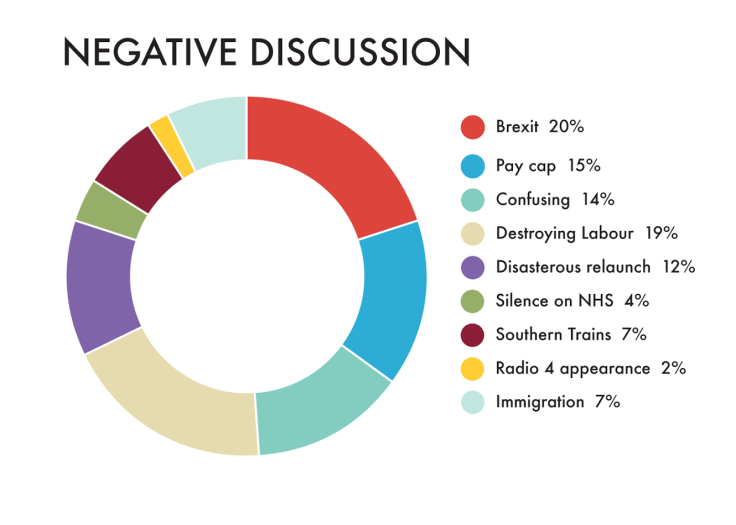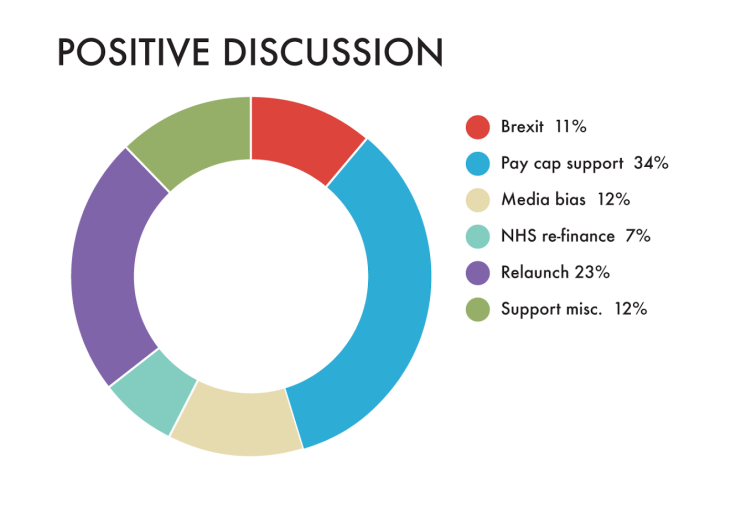Corbyn's relaunch has failed to win the people over
Forget the myth of Corbyn's 'secret' support - he won't manage to pull off a 'Trump'.
This was supposed to be the week when it all started to change. When the re-launch of Jeremy Corbyn caught our imagination. When he bypassed mainstream media, went directly to the people, riding his anti-establishment bandwagon, and the day we heard his siren songs on Brexit, on immigration, on the free movement of labour and on a policy of maximum earnings.
And, let's face it – he ballsed it up.
Faced with a government which intersperses silence with confusion over the key issue of Brexit and with a political landscape as fluid as it has been in living memory, there ought to be an opportunity for a politician able to show leadership, new ideas and authenticity. To show analytic wisdom over the problems and consistency and coherence over the answers to those problems.
It's not so much the policies themselves. Right now there is clearly no 'right answer' on Brexit. Immigration is an issue which needs tackling with humane and economic responses. The disparity in incomes desperately needs addressing.
Instead, Corbyn did the rounds of the TV and radio stations and announced a pay cap, before backtracking on that (to a pay ratio). He talked the talk on free movement of labour, before reversing to something far woolier and announced that Britain could thrive after Brexit, having campaigned to remain.
It's not so much the policies themselves - it's the failure to deliver them with conviction and consistency even as he travelled from one media booking to another.
The media verdicts were damning, but Corbyn isn't looking for media support. He's looking wider, aiming for the Trump tactic of appealing over the heads of the establishment directly to the people. Only that didn't work either.
The social media analysis company Impact Social looked at social media posts and comments on open news forums from the moment of launch to midday Wednesday to listen to how the reboot of Jeremy went. Taking out media, politicians and campaign groups left the reactions of 25,000 posts in that 30 hours or so. This data doesn't include the improved performance Corbyn put up at PMQs, but we know from previous data explorations that these occasions don't resonate much beyond Westminster.

The bad news for Corbyn was that, at a time when he was supposed to be setting a new vision, the sentiment around that vision, and him personally, wasn't great. If the idea was to go for a Trumpesque rally of support, then it isn't working. Corbyn was viewed negatively by 50% of the posts (31% positive, the rest neutral).
Compare that to Trump's social media data just before the US election when the polls were showing a narrow lead for Hillary Clinton. The social media showed 54% support for Trump, 29% for Clinton. Traditional polling failed to spot Trump's victory in the US, while social media data was more accurate. Right now, in the UK, both the polling data and the social media data are bad news for Corbyn.
The topics which enraged social media users were varied - the acceptance of Brexit took 20% of the negative posts, while the pay cap (15%) and his support for the strikers on Southern Rail (7%) and his stance on immigration (7%) were also significant.
But more than the policies, it was the handling that annoyed. Amongst the negativity, 14% found it 'confusing', 19% said he was 'destroying Labour', and 12% found the relaunch simply 'disastrous'.
Apart from the policies and the handling of the announcement of the policies, it went pretty well, then.

It wasn't all bad news. The pay cap/ratio went down better than the delivery of it deserved, gaining 34% of the positive posts, but much of the rest of the positivity was either general mutterings of support (12%), talk about the relaunch in itself (23%) or the trusty complaints about media bias (12%).
There's not much for Team Corbyn to cling on to - the attempt to rebrand him and the Labour Party didn't get off to a flier. While aping Trump's tactics makes sense in a fractured media landscape, Corbyn has failed to galvanise support around himself in the way that Trump did. Trump is virtually a media outlet on his own, able to set the agenda like no-one else.
Where Trump was divisive, Corbyn seems more derided. The Tories have deliberately ignored him, thereby painting him as an irrelevance. In the absence of a label from the opposition (in the mold of 'crooked Hillary'), and in the absence of a strong message from the man himself, voters are attaching their own. None have stuck, which is telling, but many have circled - 'hapless', 'inept', 'confusing', 'floundering', 'absurd', 'shambles' and 'weasel' are just a few of the thesaurus entries under 'Corbyn'.
If this week was supposed to be the point at which it all changed for Corbyn, then that may have been mission accomplished. Not in the way they wanted, of course. This may have simply been the point at which the conceit that Corbyn was somehow 'secretly winning' was exposed. It's not that polls and media are saying one thing and voters are saying something else. They're all saying the same thing. And it's time Corbyn listened.
Jimmy Leach is a digital consultant, working on platforms and communications for governments, corporations and start-ups. Follow : @JimmyTLeach
© Copyright IBTimes 2025. All rights reserved.






















